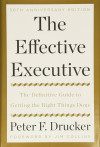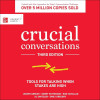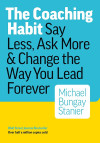Managing Oneself
"Managing Oneself" addresses a fundamental shift in how careers develop in the knowledge economy. Peter Drucker argues that individuals must take responsibility for managing their own professional development, moving beyond traditional organizational career management to become active architects of their own success.
The book provides practical methods for developing self-awareness about your strengths, working style, values, and optimal contribution. Drucker introduces feedback analysis as a systematic way to discover your actual capabilities rather than relying on assumptions. He shows how understanding whether you're a reader or listener, how you learn best, and what values drive you can shape career decisions and daily effectiveness.
Rather than offering generic career advice, Drucker focuses on helping readers understand their unique profile and how to position themselves for opportunities that match their capabilities. The book emphasizes that success comes not from trying to change yourself, but from finding roles and situations where your natural strengths can create maximum impact.
By reading Managing Oneself, you will:
Master feedback analysis to discover your true strengths: Learn a systematic method for identifying your actual capabilities over 2-3 years, moving beyond assumptions to build performance on genuine strengths rather than trying to fix weaknesses.
Understand your optimal working conditions and communication style: Determine whether you're a reader or listener, how you learn best, and what environment enables your peak performance, then apply this knowledge to choose roles and manage relationships more effectively.
Align your values with your career choices: Identify your core values and learn how to evaluate whether organizations and opportunities match your principles, creating the foundation for sustained motivation and effectiveness.
Define and plan your unique contribution: Ask the right questions about what situations require, how your strengths can address those needs, and what results would make a meaningful difference, then create action plans that focus your energy on high-impact activities.
Books to Follow
- "The Effective Executive" by Peter Drucker: Builds on self-management principles by showing how to translate personal effectiveness into organizational results. While "Managing Oneself" focuses on self-awareness, this book demonstrates how to apply that knowledge to executive decision-making, time management, and building on strengths within organizational contexts.
- "StrengthsFinder 2.0" by Tom Rath: Provides a modern assessment tool for identifying natural talents and offers specific strategies for developing them into strengths. The book complements Drucker's feedback analysis approach with structured frameworks for understanding and applying your top talent themes in work situations.
- "The Coaching Habit" by Michael Bungay Stanier: Shows how to apply self-awareness principles when working with others. The book teaches question-based approaches that help team members develop their own self-knowledge and find their best contribution, making it valuable for managers who want to help others apply Drucker's concepts.
- "Dare to Lead" by Brené Brown: Explores how self-awareness about values, emotions, and working style enables authentic leadership. Brown's research on vulnerability and courage provides a modern context for Drucker's emphasis on understanding your values and working authentically within organizational settings.
- "The Making of a Manager" by Julie Zhuo: Offers practical application of self-management principles specifically for product and technology roles. Zhuo shows how understanding your strengths, communication style, and values can guide decisions about team structure, delegation, and creating environments where others can contribute effectively.
- "Crucial Conversations" by Kerry Patterson, Joseph Grenny, Ron McMillan, and Al Switzler : Develops the communication responsibility concept that Drucker introduces. The book provides specific techniques for adapting your communication to different situations and stakeholders, which is essential for applying self-knowledge in complex organizational environments.
Feedback Analysis Over Assumptions
Most people misunderstand their own strengths and weaknesses. Instead of relying on self-perception, practice feedback analysis: write down expected outcomes when making decisions, then review results after 6-9 months. This systematic approach reveals your actual patterns of success and failure, showing where to focus development efforts and which activities to avoid.
Reader vs. Listener Distinction
People process information through fundamentally different channels, and this affects every aspect of professional effectiveness. Readers need written material before meetings to contribute meaningfully, while listeners grasp concepts through discussion and verbal explanation. Recognizing your style and adapting to others’ preferences prevents countless miscommunications and performance issues.
Concentrate on Strengths, Manage Around Weaknesses
Performance builds on strengths, not on trying to eliminate weaknesses. Once you identify your strengths through feedback analysis, focus development efforts on making those strengths more productive. For weaknesses that matter, find ways to work around them or partner with others whose strengths complement your gaps, rather than spending energy on improvement that yields minimal results.
Values Alignment Drives Effectiveness
Your values determine what you consider important work and how you believe it should be done. When organizational values conflict with personal values, performance suffers regardless of skills or motivation. Understanding your values helps you choose opportunities where you can work authentically and sustain high performance over time.
Define Contribution Through Three Questions
Moving beyond self-awareness requires asking: What does the situation require? How can my strengths address those needs? What results would make a meaningful difference? This framework helps you identify where you can create maximum impact rather than simply applying your skills to available opportunities.
Communication is Your Responsibility
Effective communication requires understanding both your own style and others’ preferences, then adapting accordingly. You cannot assume others will understand you - the burden is on you to ensure your message is received as intended. This means making your communication preferences known while learning how others best receive information.
Career Development Through Positioning
Successful careers develop when prepared people meet appropriate opportunities. Rather than following rigid career plans, focus on understanding your strengths, working methods, and values, then position yourself to recognize and capitalize on situations where you can contribute effectively. This approach works better than traditional career planning in rapidly changing environments.
Q: How long does feedback analysis take to show useful results?
A: Drucker suggests 2-3 years of consistent practice to see clear patterns. However, you may notice initial insights within 6-9 months as you compare your first predictions with actual outcomes. The key is consistent application - document expectations for every significant decision and review them systematically rather than relying on memory or casual observation.
Q: What if my strengths don’t match what my organization values?
A: This creates a fundamental choice: either find ways to apply your strengths within your current environment or consider moving to organizations that better match your capabilities. Drucker argues that trying to change your basic strengths is futile, so long-term success requires finding alignment between what you do well and what’s valued in your environment.
Q: How do I know if I’m a reader or listener?
A: Reflect on situations where you’ve performed well versus poorly in meetings or presentations. Readers typically struggle in verbal-only meetings but excel when they can review materials beforehand. Listeners engage effectively in discussions but may find lengthy written reports difficult to process. Most people have a clear preference, though some can function adequately in both modes.
Q: What’s the difference between values and ethics in Drucker’s framework?
A: Ethics refer to universal principles of right and wrong, while values in this context mean your beliefs about how work should be done and what constitutes meaningful contribution. For example, you might value innovation over stability, collaboration over individual achievement, or quality over speed. These aren’t moral judgments but preferences that affect your motivation and performance.
Q: How do I apply this if I’m early in my career and don’t have much feedback yet?
A: Start feedback analysis immediately with whatever decisions you’re making now, even small ones. Also pay attention to your learning and working preferences through observation. Notice when you feel energized versus drained, when you grasp concepts quickly versus slowly, and when you produce good work versus struggle. Early career is actually ideal for developing this self-awareness.
Q: What if feedback analysis shows I’m in completely the wrong role?
A: Drucker suggests making gradual adjustments rather than dramatic changes. Look for ways to modify your current role to better match your strengths, or position yourself for internal opportunities that offer better alignment. Use the self-knowledge to make informed decisions about future opportunities rather than making immediate major changes based on limited data.
Q: How does this apply to technical roles where specific skills matter more than working style?
A: Even in technical roles, how you work best affects your performance and career trajectory. Understanding whether you excel in collaborative coding environments or focused individual work, whether you learn new technologies through documentation or experimentation, and whether you contribute best as an implementer or architect shapes both your current effectiveness and career development choices.
Q: What if my manager doesn’t understand or accommodate my working style?
A: Drucker places responsibility for communication on you. Explain your working preferences clearly and demonstrate how accommodating them improves results. If possible, show the business impact of working within your optimal conditions. However, if the environment fundamentally conflicts with how you perform best, this may indicate a poor long-term fit that requires strategic career planning.
- When transitioning from individual contributor to management roles: You’re moving beyond executing tasks to enabling others’ success. The book helps you understand your leadership style, communication preferences, and how to create conditions where both you and your team can contribute effectively while maintaining authenticity to your working style.
- During mid-career evaluation or job transitions: You’re questioning whether your current role matches your capabilities and values. The book provides frameworks for honest self-assessment and helps you identify what types of opportunities would better match your strengths, learning style, and contribution potential.
- When facing persistent performance challenges: You’re working hard but not seeing the results you expect. The book helps you diagnose whether the issue stems from misalignment between your natural working style and your environment, or from trying to build performance on areas where you lack genuine strength.
- As you take on cross-functional collaboration responsibilities: Your success increasingly depends on working effectively with diverse stakeholders. The book’s emphasis on communication responsibility and understanding different working styles becomes essential for navigating complex product development environments and building productive relationships across teams.
Your support helps me maintain and improve the book recommendations for everyone.



